Papers by Olufemi M U I B I Saibu
African Development Review, Dec 1, 2008
... MO Saibu, Department of Economics, Obafemi Awolowo University, Ile-Ife, 234 220005, Southwest... more ... MO Saibu, Department of Economics, Obafemi Awolowo University, Ile-Ife, 234 220005, Southwest Nigeria. Tel.: 234 (0) 805 338 1914, 234 (0) 803 351 8639; e-mail: omosaibu@oauife.edu.ng, omosaibu@yahoo.com; SI Oladeji, Professor in the Department of Economics ...
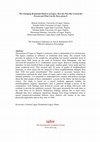
The position of Lagos as Nigeria's economic centre is entrenched in its colonial past. This legac... more The position of Lagos as Nigeria's economic centre is entrenched in its colonial past. This legacy continues to influence its residential areas today. The research work provides an analysis of the complexity surrounding low-income residential areas of Lagos since 1960, based on the work of Professor Akin Mabogunje, who had surveyed 605 properties in 21 communities across Lagos. Based on existing housing amenities, he had classified them as high grade, medium grade, lower grade and low grade residential areas. This research asks: In terms of quality of neighbourhood amenities, to what extent has the character of these neighbourhoods changed from their 1960 low grade classification? This research is necessary because these communities represent the inner slums of Lagos, and in order to proffer solutions to inherent problems, it is important to understand how colonial land policies brought about the slum origins of these communities. Lessons for the future can then become clearer. The study is based on a mixed methods approach suitable for multidisciplinary inquires. Quantitative data is gathered through a survey of the communities; with findings from historical records and in-depth interviews with residents to provide the qualitative research. This paper documents the work done so far, with focus on six districts. Preliminary findings indicate that in most cases, although they have undergone significant changes from being residential areas to mixed commercial-residential districts, these districts still remain in the same physically deplorable state as they were in 1968.
Journal of Policy Reform, Sep 1, 2004
... However, growth is not sufficient for macro-economic stability; inflation, unemployment, a de... more ... However, growth is not sufficient for macro-economic stability; inflation, unemployment, a declining exchange rate, and low capacity utilization should also be avoided. Several policies have been carried out to ameliorate poverty problems in Nigeria. ...
Journal of Developing Areas, Sep 1, 2022
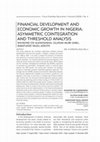
Forum Scientiae Oeconomia, Dec 28, 2020
This study examines the nonlinear relationship between financial development and economic growth ... more This study examines the nonlinear relationship between financial development and economic growth in Nigeria, covering the period from 1980 to 2018, in an effort to explain the direction of linearities and determine the exact threshold policy points for financial development variables. The financial development proxies adopted in the study are broad money and credit to the private sector. While deploying the nonlinear autoregressive distributed lag (NARDL) approach to ascertain the asymmetric cointegration status of financial development and GDP growth, the turning point between the variables of study is estimated using the threshold regression approach. The findings from the NARDL analysis show that the relationship between the financial development variables and economic growth are cointegrated in the long run and have a U-shaped asymmetrical relationship. Furthermore, the discrete threshold regression analysis reveals that while the switching point for broad money is 17.73% of GDP, it is 6.03% of GDP for credit to the private sector. Therefore, whenever the level of the financial development indicators falls below the estimated tipping point, there is a drag on the country's economic growth. The study recommends the implementation of the financial development threshold points as the minimum levels by which to achieve positive effects on the country's economic growth. A further recommendation to achieve rapid progress in financial development entails the rapid monetisation of financial transactions and the expansion of financial access as well as the strengthening of efficiency and regulation of the financial markets.
The International Journal of Applied Economics and Finance, Feb 1, 2007
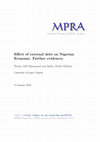
RePEc: Research Papers in Economics, Jan 15, 2019
The study sought further evidences on the effect of external debt on economic growth in Nigeria. ... more The study sought further evidences on the effect of external debt on economic growth in Nigeria. Time series data on external debt stock, real gross domestic product, trade openness, and gross fixed capital formation as a percentage of GDP as well as data on inflation and exchange rates were obtained from the Central Bank of Nigeria (CBN) Statistical Bulletin and World bank indicators. The study set out to test for both the long run and short run relationship as well as presenting further evidences on the relationship between external debt and economic growth. The Autoregressive Distributed Lag (ARDL) Model was employed as a technique of estimation in the study and the results led a finding that the external debt contribute negatively to growth in Nigeria based on data from 1981 through 2016 which was in line with Ayadi and Ayadi(2008). The study recommended amongst others, the need for accountability in governance, good macroeconomic policy environment, proper acquisition and use of debt solely for productive reasons and the enhanced exportation of domestic products.
Social Science Research Network, Nov 12, 2010
... The emergence of severe economic difficulties towards the mid 1980s forced Nigeria to adopt e... more ... The emergence of severe economic difficulties towards the mid 1980s forced Nigeria to adopt economic reforms in 1986, as ... was characterized by a system of fixed credit allocation, a subsidized and regulated interest rate regime, exchange rate control and import licensing. ...
Routledge eBooks, Feb 8, 2023
The Journal of Developing Areas, 2022
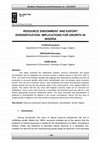
Studies in Business and Economics, 2018
This paper examined the relationship between resource endowment and export diversification and it... more This paper examined the relationship between resource endowment and export diversification and its implication for economic growth in Nigeria based on data from 1981 to 2015. The result of the Granger causality test suggests that unidirectional causality runs from oil production to economic growth, while export diversification does not granger cause economic growth. From the error correction result, it was established that export diversification positively impacts growth from the last two periods, while in the current period, it has negative effect on growth. This means that the key issue with Nigerian economy might not be structural but institutional. That is, even if the economy is diversified, the expected result may still be a ruse without appropriate economic institutional reform. The study concludes that specialisation is preferred to diversification for Nigeria in the current circumstance. Hence, the key issue to sustain growth in Nigeria is not in the number of productive se...

The study examined the impacts of mobile telecommunication on the Nigerian economy and also exami... more The study examined the impacts of mobile telecommunication on the Nigerian economy and also examined the growth implication in terms of income generating capacities of households, provision of employment as regards to business expansion in three states in south west Nigeria; namely Oyo, Osun and Ekiti. Primary data was used for the study. One hundred and fifty (150) Questionnaire was administered to generate information and Multi-stage stratified random sampling procedure was also used in selecting the respondents from different zones in the survey area. Data collected from was analyzed using econometric technique. In the econometric technique used, two models were specified and Ordinary Least Square method (OLS) and multiple regression analysis were used in estimating the factors that impacted on mobile telecommunications as stated in the objectives of the study. However, the findings revealed that there are several ways telecoms have impacted on the economy of the individual house...
This study investigate whether there is heterogeneity in the response of both commercial and merc... more This study investigate whether there is heterogeneity in the response of both commercial and merchant banks to changes in monetary policy using quarterly time series data from Nigerian economy 1980(1)-2000(4). The Error Correction Mechanism and Co-integration techniques were adopted to examine the characteristics of the variable and to draw policy inference. The model comprises a measure of bank performance function estimated on interest rate exchange rate, legal reserve requirement, political instability and macroeconomic instability. The empirical results showed that exchange rate, legal reserve requirement and interest rate and negative effects on merchant banks performance than commercial banks. The outcome of this finding then suggests that changes in monetary policy have much negative effect on merchant banks than on the commercial banks in Nigeria
Journal of Economic and Financial Sciences, 2020

Applied Economics and Finance, 2023
The primary objective was to evaluate the extent to which foreign exchange restraints import dema... more The primary objective was to evaluate the extent to which foreign exchange restraints import demand in Sierra Leone. Using time series data from 1980 to 2020, this study determined Sierra Leone's import demand function by including foreign exchange constraints in a structural model developed by Emran and Shilpi (2010). The model compensated for both short-run and long-run links by employing an ARDL bounds-testing technique with an error-correcting mechanism. The result showed that only the presence of a long-run relationship between domestic consumption and import demand was supported by empirical evidence. In the short run, domestic consumption, scarcity premium, and trade liberalization were found to be significant predictors of Sierra Leone's actual import demand. However, in the long run, only domestic consumption was found to be significant. Typically considered as the key determinants of import demand, real effective exchange rates and scarcity premiums were insignific...

Social Science Research Network, Oct 4, 2017
his paper examined whether monetary policy is acyclical, procyclical or countercyclical and the i... more his paper examined whether monetary policy is acyclical, procyclical or countercyclical and the implications of the interaction of such cyclicality with industrial output on real economic growth in Nigeria. After determining the time series properties of the variables and based on conventional cyclicality measures, the fully modified ordinary least square method was used to examine the impact of monetary policy cyclicality and industry output on economic growth. Granger Causality test was used to examine the causal relationship between the monetary cyclicality and output growth. The results showed that monetary policy is countercyclical on economic growth in Nigeria. Monetary policy cyclicality had significant impact on economic growth and the causality test also indicated that monetary policy has a direct effect and indirect effect through industrial output growth on real economic growth in Nigeria. The findings are consistent with similar studies in other countries, and the policy implication of the results is that despite the recent doubt, monetary policy is still a potent stabilization policy that can be used to stimulate industrial-output growth and counter the recent downturn in real economic activities in Nigeria.

Annals of Data Science
The incursion of COVID-19 into global space has constituted both public health emergency and econ... more The incursion of COVID-19 into global space has constituted both public health emergency and economic crisis, thus there is need to investigate the transmission of inherent uncertainty associated with the pandemic on stock markets. Based on this, this study investigates the dynamic interaction of COVID-19 incidence and stock market performance in Nigeria. The study uses daily time series data between 2/4/2020 and 8/8/2020 of All Share Index (ASI), COVID-19 pandemic confirmed cases, Nigerian borrowing rate and exchange rate to conduct the analysis. Sequel to careful econometric investigation of data, vector autoregressive model was adopted for estimation due to the dynamic nature of the study. The estimation results show that the lagged value of COVID-19 infections exerts negative impact on ASI; specifically, a unit increase in COVID-19 infections causes ASI to fall by 0.066%. Similarly, the lagged value of ASI exerts negative impact on COVID-19 cases. Equally notable, a unit increase in ASI causes covid-19 cases to fall by 0.02% though it is not statistically significant. The study concludes that COVID-19 has a negative effect on Nigerian stock market performance; therefore, apart from small and medium enterprises government may need to extend stimulus package to public quoted firms as part of the efforts to bring the economy back on track.
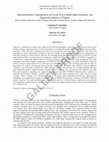
Nigeria is a small open economy with a high level of external dependency especially on the export... more Nigeria is a small open economy with a high level of external dependency especially on the export of crude oil for foreign earnings and government revenue and import of consumables goods including pharmaceutical products. Currently, China and USA contribute more than 35% of Nigerian total import and in addition with Euro area constitute top export destinations of Nigerian crude oil. Studies in the past have investigated the vulnerability of Nigerian economy to external shocks, however, the emerging shocks from global economy due to COVID-19 seems unprecedented. Thus, it is imperative to preemptively examine the likely spillover effects of COVID-19 pandemic to a small open economy like Nigeria based on shocks to strategic trade partners. Given this background, this study investigates the macroeconomic consequences of COVID-19 in China, the Euro area and United States of America (USA) in Nigeria using Global Vector Autoregressive (GVAR) approach. This modelling approach provides an opportunity to analyze international macroeconomic transmission of shocks and spillovers between different countries. It also provides a framework to offer adequate tools to deal with the curse of dimensionality that may arise during the analysis. Macroeconomic variables such as exchange rate, economic growth, inflation rate, trade flows and consumers' spending were employed from Nigeria and other COVID-19 infected partner countries to build the GVAR model. Similarly, variable such as oil price and world commodity price index served as global variables. These variables were introduced quarterly to obtain stable behavioural interactions. Subsequently, simulations were performed to capture economic reality of COVID-19 and policy reactions in COVID-19 infected partner countries. The study identified output and inflation shocks in USA and China as important external shocks to the Nigerian economy however, oil price shocks constitute the biggest external threat to the economy during and post COVID-19 era.











Uploads
Papers by Olufemi M U I B I Saibu